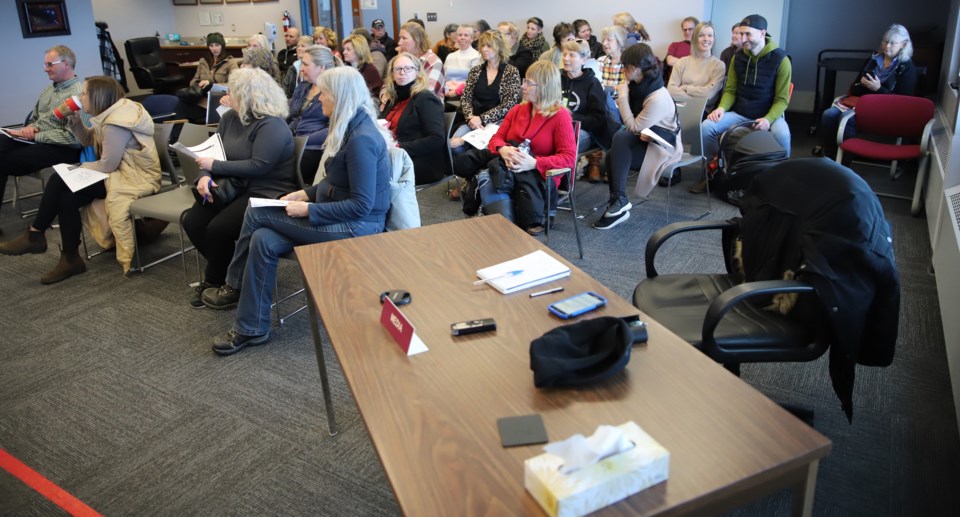OLDS — About 50 people showed up to an Olds council meeting on Feb.13 expressing fear that the town may become a “15-minute city” or “smart city.”
They said they believe those concepts are an attempt by the United Nations (UN) and/or the World Economic Forum to control residents, restrict their movements and invade their privacy.
The crowd was so large that it overflowed the chamber gallery. To accommodate the crowd, staff set out an extra 10 chairs or so plus some office chairs.
Some people still ended up standing in the adjacent coffee/cloakroom area. Still others watched the proceedings online.
An approximately 58-minute question and answer period ensued, during which members of the crowd asked council members questions about their plans regarding the two concepts.
Mayor Judy Dahl, a few councillors and chief administrative officer Brent Williams answered those questions, saying they have no plans to implement either concept because they have no desire to, it’s impractical and far too expensive for the town.
Several speakers offered to work with council on a committee of some sort regarding the matter. Some said the two concepts will be linked.
It appeared that in Olds’ case, the crowd’s fear was at least partly sparked by the fact that Olds is listed on a federal government Infrastructure Canada website as an applicant for a Smart Cities Challenge competition.
Williams told the crowd that in 2018, after holding discussions with the public, the Town of Olds and the now-defunct Olds Institute for Community & Regional Development made a submission to the challenge, hoping to win and be awarded $5 million to create an Olds Health Network.
Their pitch was to make simple connections to reduce health-care costs by 30 per cent and improve mental and physical well-being for all residents. That submission didn't win, although it is still lisrted on the federal government's website.
Williams also said records indicate that in 2015, the Olds Institute – not the town – joined the Smart Cities Alliance, created under by the federal government when the Conservatives were in power. He said it appears that alliance has since become “defunct.”
Olds resident Leslie Eling asked for a definition -- as council knows it -- of the two concepts.
Coun. James Cummings said there are two views as to the concept of a 15-minute city. One is to have all the amenities that people require within a 15-minute commute. He said the other is to restrict residents’ movements within certain districts.
He said the urban planning concept grew out of efforts to streamline traffic in crowded cities with narrow streets such as Oxford and London England. He indicated that’s not the case in Canada.
“As far as I know and going by research, there’s no interest at all in restricting people into a 15-minute neighbourhood,” Cummings said.
“The cost of that would be in the billions of dollars. The Town of Olds doesn't have that much money to lock you into a 15-minute walk.”
Even in Oxford’s case, Cummings said it’s his understanding that that plan has not yet received the final go-ahead.
Cummings said one idea behind a smart city is to utilize technology to make things like traffic flow more efficient. He noted that that technology has been adopted by private businesses like trucking firms for maintenance and other purposes.
Cummings said smart technology could also be used for surveillance purposes but he doesn’t anticipate the town doing that.
“Again, we don’t have the tens of millions of dollars to implement an active surveillance system throughout the entire community,” he said.
Eling indicated she’s still not reassured.
"Words such as restrictive and surveillance are words that don’t invite freedom, that don’t invite anonymity. What they do invite is fear and I think that’s what a lot of this is based on,” she said.
“I value our freedom. I value your freedom. I value my community and I’m here to fight for it – whatever that looks like.”
Bowden resident April Reeves said the UN started the effort to implement smart cities and 15-minute cities as far back as the early 1980s.
Reeves said she’s so committed to stopping implementation of these concepts that she’s working with five lawyers and going to communities across the province.
As Reeves further discussed her concerns, she began to cry. Legislative clerk Marcie McMillan handed her some tissues.
“In ‘83 and ‘84, I could have cared less, because I wasn’t even going to be around in 2050. I care a lot more now because I’m going to be around in 2030 and even 2040,” she said.
Didsbury resident Wendy Jones asked mayor Judy Dahl if she’s a member of the Global Covenant of Mayors.
The Global Covenant of Mayors For Climate & Energy website says the group consists of mayors who “share a long-term vision to combat climate change. Together, we are working towards a low-emission and climate-resilient future.”
Dahl said she is “absolutely not” a member of that group. In fact, she said had not heard of it at that point.
“I’m not a big city mayor, I’m not a political mayor. I am a community mayor,” Dahl said, sparking loud applause.
Coun. Heather Ryan said she and her fellow councillors had not even discussed either concept until it came up during the Feb. 13 meeting.
She said it's just not practical to implement a 15-minute city in a small but spread-out town like Olds.
“As for the restrictive thing, I think that that’s not something that I would ever entertain,” she said.
Dahl agreed, adding council has far higher priorities, like providing better transportation for seniors and students.
"A lot of people think we know everything, but we don’t,” she said. “So if you talk to us and we collaborate together, there’s got to be truth in there somewhere. We’ll find it together – we hope.”
At the end of the meeting, Dahl thanked everyone for coming. The crowd applauded.



